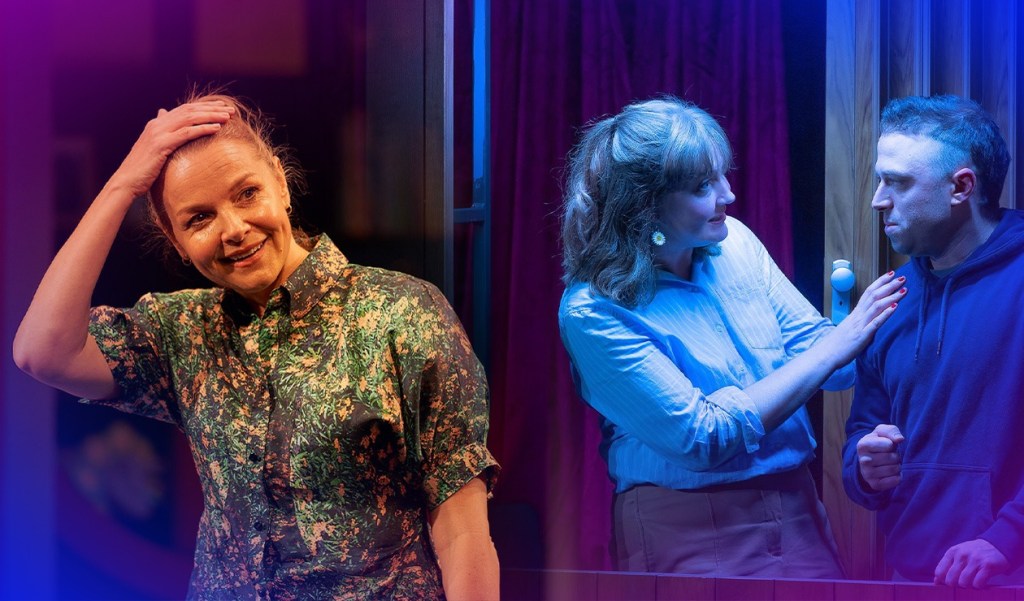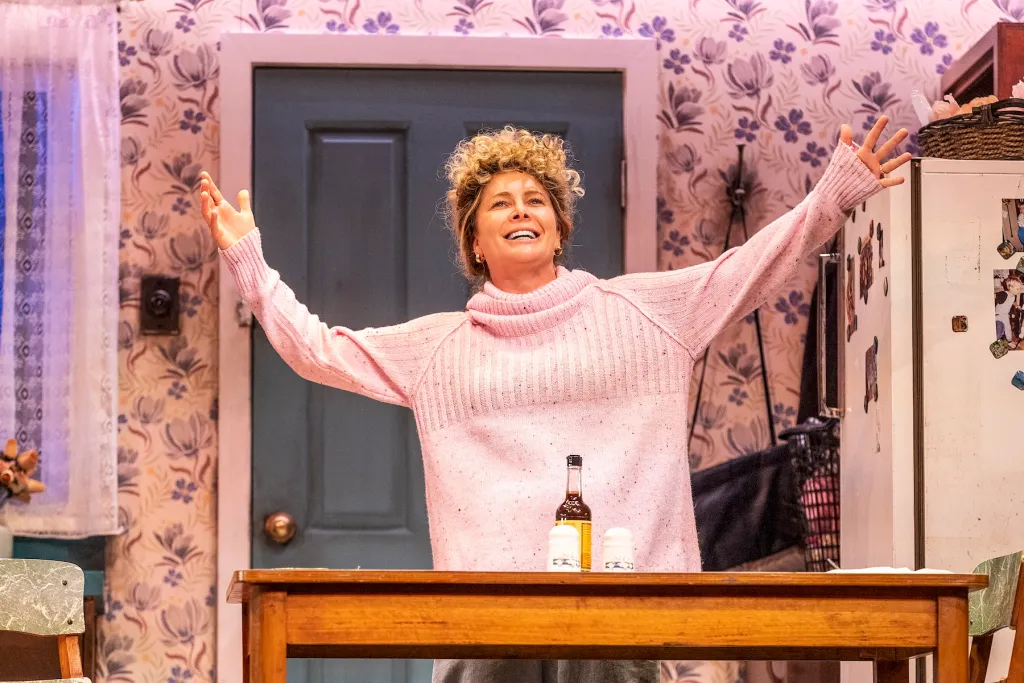These two plays are so compelling they’ve been brought back to the SA stage
In a rare move, State Theatre Company SA is this month bringing back to the stage two sell-out shows: one an edge-of-the-seat single-hander starring Justine Clarke and the other a stellar play set in country South Australia that is also touring regionally.

On the surface, Girls & Boys and Euphoria seem to have little in common. The former, by UK writer Dennis Kelly, had its world premiere at London’s Royal Court Theatre in 2018 with actor Carey Mulligan (known from films such as She Said and Suffragette) starring as an unnamed British woman recounting the story of the disintegration of her marriage. The latter, penned by local playwright Emily Steel on commission for Country Arts SA, is grounded in regional Australia and premiered at Renmark’s Chaffey Theatre in 2021 with Adelaide actors Ashton Malcolm and James Smith.
However, both tell important, compelling, contemporary stories and resonated so strongly with South Australian live audiences when they were presented previously that it was decided to mount return seasons this year.
Justine Clarke earned glowing reviews for her performance in State Theatre’s production of Girls & Boys – which sold out during its 2022 Adelaide Festival season and again at the 2023 Sydney Festival – and believes there are several reasons the play has struck a chord.
“I think we’re in a period of reconnection after COVID, and a direct-address play where one actor stands on stage without any bells and whistles and tells a story is something we have missed… it’s like we’re reacquainting ourselves with the very essence of theatre-making and what it can do,” she tells InReview.
The play itself, she adds, is like a rollercoaster ride. Because it relies on a single performer, the other character is essentially the audience, and they don’t know what is going to happen next.
“It’s a very alive feeling in the room… and it’s a very arresting piece of theatre; it’s beautifully written and beautifully crafted in terms of its structure.
“It goes by really quickly. It’s an hour and 50 minutes but it doesn’t really feel like that. Everyone in the audience goes on the journey together.”
Girls & Boys, which is playing at the Dunstan Playhouse from August 2-5, is directed by State Theatre artistic director Mitchell Butel and described by the company as “a ticking timebomb”, “an engrossing, edge-of-your-seat play that shifts gears from Fleabag-like wit and mischief to harrowing shock in a matter of seconds”.
You might like
It is difficult to describe the plot without giving away too much, but Clarke says her character tells the story of how she met her husband, how they fell in love, the early stages of their marriage and having children – and then how things change.
“There’s two parts to it. One is direct address to the audience and the other is a play without other characters on stage. So there are two modes of theatre at work.
“And it’s very funny; she’s a Londoner, she’s kind of ballsy and brave and funny, and you connect with her immediately. It’s like she’s talking to her girlfriends.”

Justine Clarke in State Theatre Company’s production of Girls & Boys. Photo: Sam Roberts
Being the sole performer in a play with a run time of 110 minutes with no interval sounds like it would take a toll on any performer. However, Clarke – whose acting credits range from Playschool, to the TV series Love My Way and House Husbands, to embodying Julia Gillard in Sydney Theatre Company’s recent production Julia – says that as soon as she gets on stage, she starts to lose sense of time.
“And everything is on a bit of a knife’s edge, so it feels quite dangerous at times out there, but it’s very rewarding to be in the centre of the story,” she says, explaining that part of the potency of Girls & Boys is its sense of immediacy.
“It’s told, obviously, from the woman’s perspective, and when she tells the story she tells it as if she’s in it at the time, so every part of the story you definitely feel like you’re with her; she’s not telling it in retrospective, she’s in each stage of the relationship.”
For Clarke, research into the subject being explored is an important element of the acting process. She says it helps ground her in the reality of the story – and with Girls & Boys, which “very much draws from truth”, this was especially helpful.

Ashton Malcolm and James Smith in Euphoria. Photo: Chris Herzfeld
Research and truthfulness is also integral to Emily Steel’s Euphoria, which is the result of an extensive consultation period during which the playwright and Country Arts SA arts and health creative producer Alison Howard met with people in South Australian regional communities and spent time in mental health units to learn about “the joys and challenges of country life”.
Subscribe for updates
Described as “an Antipodean Under Milk Wood”, the play follows teacher Meg (Ashton Malcolm), who is organising a festival called Euphoria to celebrate her country town. Her former student Ethan (James Smith) doesn’t think there’s anything worth celebrating; he feels stuck in the town where everyone knows his tragic family history. Both characters are struggling and their worlds collide as the community comes together for the festival.
A co-production between Country Arts SA and State Theatre Company, Euphoria played at the Adelaide Festival Centre’s Space Theatre and toured to 15 regional SA towns in 2021, with InReview reviewer Rachael Mead describing it as “wildly funny and heartbreaking… a stellar production on every level”. It has been touring nationally this year, and will have a return season at four regional SA towns this month before playing at Norwood’s Odeon Theatre from August 22-26.
“I hope it has a truthfulness and people can recognise elements of their own lives and communities in it,” says Steel, pondering the success of the play.
“I think there’s an appetite for stories that are based in the Australia and the South Australia that we live in now; they are stories about us.”

Playwright Emily Steel. Photo: Sia Duff
Steel, who is originally from Wales and also wrote the multi-award-winning play 19 Weeks, learnt many things during the time she spent in regional areas while researching Euphoria. One was how important rain was for the livelihood of everyone in a farming community; another was the difficulty of accessing health care in an emergency, especially a mental health emergency.
“Then there’s things like how everyone goes to the footy and that’s the big social occasion and you will see everyone there… and the importance of the pub and how everyone will end up there because that’s the place to go.”
She says feedback has shown that elements of Euphoria – such as living somewhere where everyone knows your business – spark recognition in urban and regional/rural audiences areas.
“Some of the feedback from regional areas was that it felt truthful, it felt like seeing their community. Some people with lived experience of mental illness would say it felt like their experiences, so that’s been quite heartening.”
Interestingly, while the program notes and reviews for Euphoria highlight the humorous aspect of the play, Steel says she never sets out to write comedy.
“I set out to write characters that feel truthful to me and say things that people would actually say, but my sense of people in the world is that they are heartbreaking and absurd at the same time. I think life is hard and funny.”
Girls & Boys is playing at the Dunstan Playhouse from August 2-5, after which is will tour to Hobart’s Theatre Royal from August 10-12. Euphoria is touring to Whyalla (August 2), Port Pirie (August 4), Renmark (August 10-11) and Mount Gambier (August 15) with Country Arts SA (details here), before its season at the Odeon Theatre from August 22-26.

